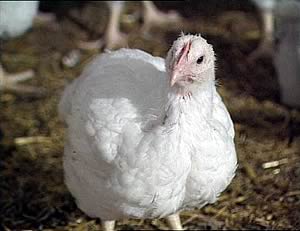| 23/03/07
Vaccinating poultry, combined with several other control instruments,
is an important tool in the worldwide battle against the H5N1 virus,
according to an international scientific conference that ended in
Verona on Thursday 22nd March 2007.
 |
Around 400 experts reviewed the recent experiences and
achievements of vaccination programmes carried out in many countries
worldwide. The conference was jointly organized by the World Organisation
for Animal Health (OIE), the UN Food and Agriculture Organization
(FAO) and the Istituto Zooprofilattico Sperimentale delle Venezie
(IZSVe), with the support of the European Commission.
In 2007, the avian influenza virus has re-emerged in domestic birds
in 11 countries. In Indonesia, Egypt and Nigeria, the disease has
become endemic. The meeting stressed that since the beginning of
the avian influenza crisis in late 2003 disease reporting and control
policies have substantially improved.
To date, there are 169 confirmed human deaths due to infection with
H5N1 virus. A sustained human-to-human transmission of the virus
has not occurred. Fighting the disease in poultry is essential to
decrease the amount of virus in the environment and thus reduce the
risk of human infection and the threat of a possible human influenza
pandemic.
Poultry vaccination
The conference recommended that poultry should be vaccinated against
avian influenza, particularly in endemic countries and when other
control measures such as stamping out, movement controls of poultry
and biosecurity cannot stop the spread of the virus.
A successful vaccination campaign depends mainly on the use of high
quality vaccines complying with OIE standards, appropriate infrastructure
to ensure the rapid and safe delivery of vaccines (cold chain), monitoring
of vaccinated flocks, movement control of poultry, and adequate financial
resources. Efficient veterinary services complying with OIE standards
on quality and evaluation is also very important for the suspension
of the use of vaccination. Any vaccination policy should include
an exit strategy so that countries do not rely on costly long-term
vaccination campaigns. The tools differentiating infected from vaccinated
animals, such as DIVA strategy or the use of sentinel birds, are
recommended in the field when possible.
There are no elements indicating human health implications related
to the vaccination of poultry and to the consumption of poultry products
from vaccinated animals.
The conference called upon the commercial poultry industry to reinforce
its engagement in the control of avian influenza under the supervision
of national veterinary authorities.
A call to international donors for the funding of vaccination in
endemic countries, with particular focus on backyard poultry, was
also made.
Research
The conference urged the development and funding of more research
in the following fields:
- Development of new and improved vaccines;
- Development of new vaccines that combine protection against H5N1
with the control of other poultry diseases, particularly Newcastle
disease;
- Design of cost-effective delivery systems, particularly for small-holders
and backyard farmers;
- Development of a vaccination decision support model;
- Data sharing of vaccination programmes conducted under field conditions
- Impact of vaccination on production consumption and trade;
- Impact of mass culling programmes on valuable poultry genetic material.
Participants of the Verona conference also proposed to develop communication
strategies to improve the vaccination coverage, to avoid possible
market shocks and to apply basic biosecurity measures.
 Migratory birds are not to blame for bird flu Migratory birds are not to blame for bird flu
 Bird Flu Restrictions Lifted in Suffolk Bird Flu Restrictions Lifted in Suffolk
 CLA response to Avian Flu virus on a turkey farm in Suffolk CLA response to Avian Flu virus on a turkey farm in Suffolk
|



